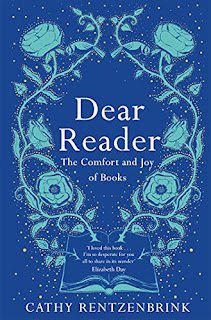For a long time, I rarely re-read anything. Too many new and exciting books, too little time to read them all. It was only around 10 years ago that I finally gave myself permission to stop reading something I wasn’t enjoying - I used to read on, to the bitter end. No longer!
Despite being a voracious reader, there never seems enough time to read the new books: I rarely felt I had the time for revisiting anything.
I read very quickly - can’t help it, always have. (See Philippa’s recent blog - 23rd March - on slow reading!) Recently, I’ve been re-reading old favourites, trying to slow myself down in order to study their structure and appreciate the language and characterisation. But of course, we also read to lose ourselves, for escapism, and I always did like to ‘drink up’ a book! So I’ve re-enjoyed books by the marvellous Anne Charnock and Anthony Doerr and can definitely recommend the comfort of a re-read of a favourite. (Warning: It didn’t work on Ulysses by James Joyce - I struggled first time round and gave up completely on my second attempt!) Listening to a story read aloud (utter joy!) definitely helps me sip it at the speed the author intended (see my blog for The Writers Company on the benefits of listening!)
Then I discovered Dear Reader: The Comfort and Joy of Books by Cathy Rentzenbrink. This tells her life story through her reading. Like me, she was a regular library visitor, and our children’s reading matched. Reading this lovely (yes, comforting, yes joyful ) book provided me with a new ‘to be considered’ list, and from it I’ve also created a ‘to be re-read’ list, with some absolute favourites. So far, I’ve loved Any Human Heart by William Boyd, I Capture the Castle by Dodie Smith, and am about to restart Life After Life by Kate Atkinson (before I watch the televised version).
When the world and all its horror is too much - and it is, increasingly, now - it’s good to be reminded of the pleasure in reading for escapism and enjoyment which I knew as I child. Which books are on your ‘to be re-read’ list?



